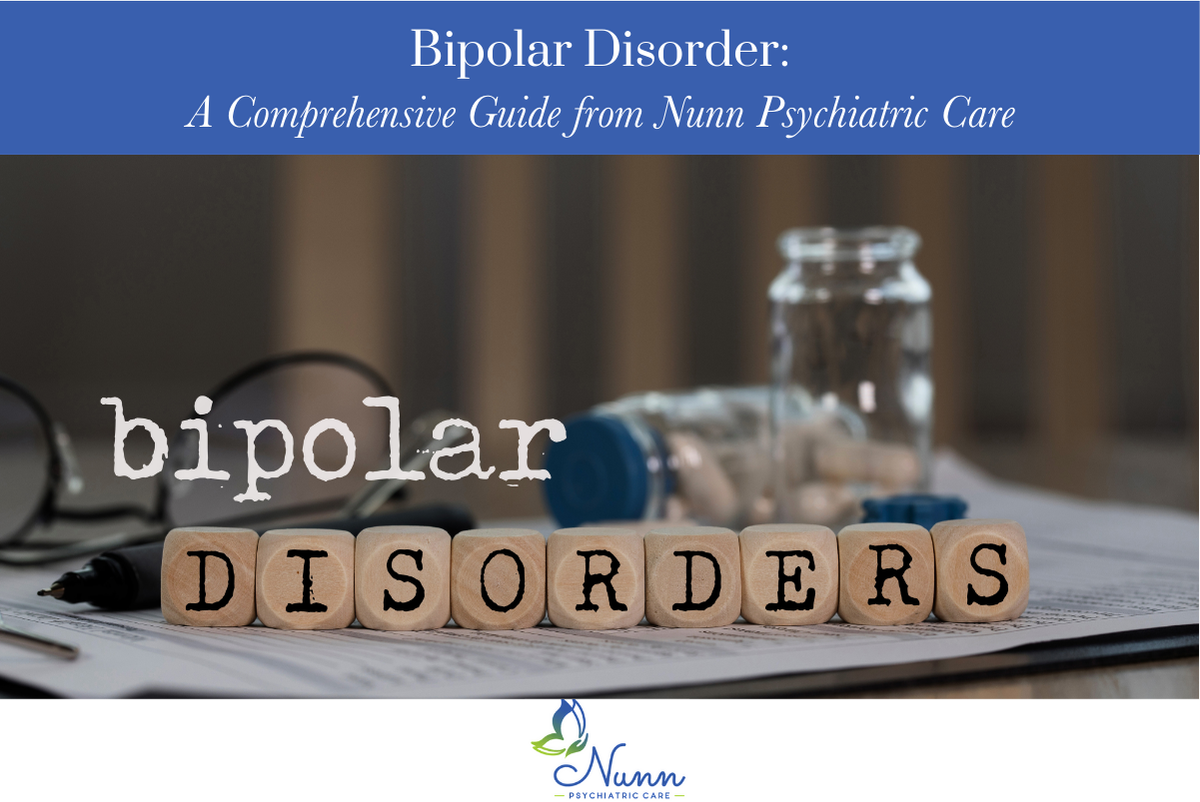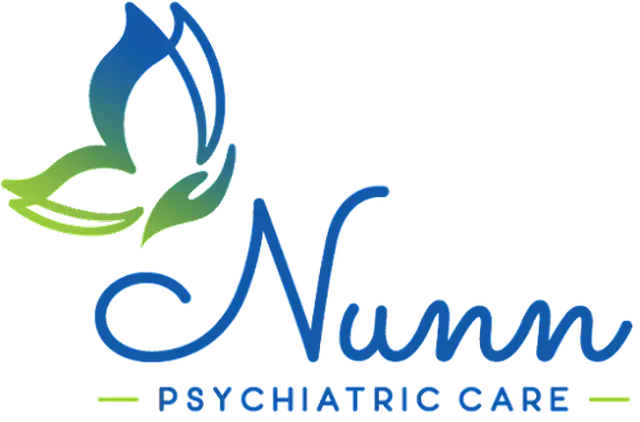 Bipolar disorder, a complex and often misunderstood mental health condition, affects millions of individuals worldwide. At Nunn Psychiatric Care, we believe that knowledge is key to managing and living well with bipolar disorder. This guide offers a thorough look into the condition, providing you with essential information, symptoms, treatments, and answers to common questions.
Bipolar disorder, a complex and often misunderstood mental health condition, affects millions of individuals worldwide. At Nunn Psychiatric Care, we believe that knowledge is key to managing and living well with bipolar disorder. This guide offers a thorough look into the condition, providing you with essential information, symptoms, treatments, and answers to common questions.
What is Bipolar Disorder?
Bipolar disorder, formerly known as manic depression, is a mental health condition characterized by extreme mood swings. These mood swings include emotional highs (mania or hypomania) and lows (depression). The fluctuations in mood can affect sleep, energy, behavior, judgment, and overall functioning.
There are several types of bipolar disorder, including:
- Bipolar I Disorder: Defined by manic episodes lasting at least seven days, or manic symptoms so severe that immediate hospitalization is necessary. Depressive episodes typically last for at least two weeks.
- Bipolar II Disorder: A pattern of depressive and hypomanic episodes, without the full-blown manic episodes characteristic of Bipolar I.
- Cyclothymic Disorder: Periods of hypomanic symptoms as well as periods of depressive symptoms lasting for at least two years in adults (or one year in children and adolescents), but the symptoms do not meet the diagnostic requirements for a hypomanic episode and a depressive episode.
Symptoms of Bipolar Disorder
Bipolar disorder symptoms vary depending on whether you’re experiencing mania, hypomania, or depression.
Manic or Hypomanic Symptoms Include:
- Feeling overly happy, energetic, or wired
- Having racing thoughts and speaking rapidly
- Experiencing an inflated sense of self-esteem or grandiosity
- Engaging in risky behaviors such as spending sprees, reckless driving, or impulsive sexual encounters
- Decreased need for sleep
Depressive Symptoms Include:
- Feeling sad, hopeless, or empty
- Fatigue or lack of energy
- Difficulty concentrating, remembering, or making decisions
- Loss of interest in activities that were once enjoyable
- Changes in appetite, leading to weight loss or gain
- Suicidal thoughts or attempts
Diagnosing Bipolar Disorder
Diagnosing bipolar disorder can be challenging due to the wide range of symptoms that can mimic other conditions like depression or anxiety disorders. At Nunn Psychiatric Care, our experienced professionals take a comprehensive approach to diagnosis, which includes a detailed psychiatric evaluation, discussion of your medical history, and psychological assessments. Early diagnosis and treatment are critical to managing symptoms effectively and improving long-term outcomes.
Treatment for Bipolar Disorder
Bipolar disorder is a lifelong condition, but with proper treatment, individuals can lead fulfilling lives. Treatment typically involves a combination of medication, therapy, and lifestyle changes.
Medication: Mood stabilizers, antipsychotics, and antidepressants are commonly prescribed to manage symptoms. Medication helps in stabilizing mood swings, reducing manic and depressive episodes, and preventing relapses.
Therapy: Cognitive-behavioral therapy (CBT), interpersonal and social rhythm therapy, and family therapy are proven approaches that help individuals understand their condition, manage symptoms, and improve their quality of life.
Lifestyle Changes: Regular exercise, a balanced diet, healthy sleep patterns, and stress management can positively impact overall mental health. Establishing a routine and maintaining close relationships are also beneficial in managing bipolar disorder.
Living with Bipolar Disorder
It’s important to understand that bipolar disorder is a chronic condition, but with the right treatment plan, many individuals are able to manage symptoms and lead productive lives. Education, support from family and friends, and ongoing communication with mental health professionals are vital components of successfully managing the condition.
Common Myths About Bipolar Disorder
Myth: People with bipolar disorder are always “up” or “down.” Fact: While bipolar disorder is characterized by mood swings, individuals may experience periods of stability, known as euthymia, between episodes of mania or depression.
Myth: Bipolar disorder is just mood swings. Fact: Bipolar disorder involves extreme changes in mood, energy levels, and behavior that are more intense and longer-lasting than typical mood swings.
Myth: Bipolar disorder only affects mood. Fact: Bipolar disorder can also affect cognitive function, memory, relationships, and even physical health.
Q&A Section on Bipolar Disorder
Q: What triggers a bipolar episode?
A: Triggers vary from person to person, but common triggers include high-stress events, significant life changes (such as moving, a new job, or a breakup), lack of sleep, and substance abuse. Keeping a consistent routine and staying aware of potential triggers can help manage episodes.
Q: Can bipolar disorder be cured?
A: Bipolar disorder cannot be cured, but it can be effectively managed with the right treatment plan. Many people live full and successful lives by adhering to a regimen of medication, therapy, and healthy lifestyle choices.
Q: How is bipolar disorder different from depression?
A: Bipolar disorder includes both depressive and manic or hypomanic episodes. Depression, on the other hand, involves only depressive episodes. Individuals with bipolar disorder experience both ends of the emotional spectrum, whereas those with depression experience primarily low moods.
Q: Can lifestyle changes help with managing bipolar disorder?
A: Yes, lifestyle changes play a significant role in managing bipolar disorder. Regular exercise, a healthy diet, good sleep hygiene, stress reduction techniques, and a strong support network can all contribute to improved stability and fewer mood swings.
Q: How do I know if I or a loved one has bipolar disorder?
A: If you or someone you know is experiencing extreme mood swings that interfere with daily life, it’s important to seek help from a mental health professional. A proper evaluation can lead to an accurate diagnosis and an appropriate treatment plan.
Seeking Help at Nunn Psychiatric Care
If you or a loved one is struggling with symptoms of bipolar disorder, seeking professional help is the first step to getting the care and support you need. At Nunn Psychiatric Care, we are dedicated to providing compassionate, evidence-based mental health care to individuals in our community.
We offer a range of services, including psychiatric evaluations, medication management, therapy, and personalized treatment plans. Our team of experienced mental health professionals is here to guide you every step of the way toward stability and improved mental health.
Contact Nunn Psychiatric Care
Nunn Psychiatric Care
113 Lincoln Dr
Hodgenville, KY 42748
Phone: (270) 358-6221
At Nunn Psychiatric Care, we understand the challenges of living with bipolar disorder, and we are committed to helping you navigate your journey to wellness. Contact us today to schedule an appointment and take the first step toward managing your mental health effectively.
